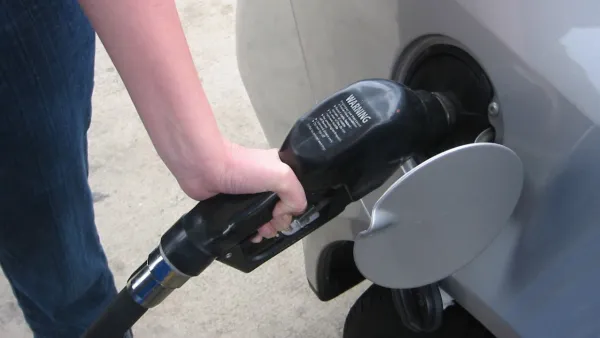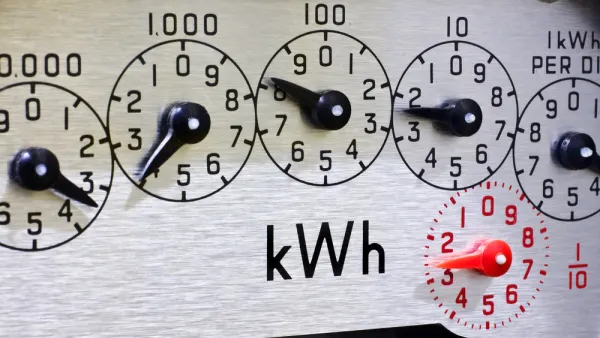Say what you will about growing corn for fuel, and there are many criticisms even coming from the environmental community, corn ethanol has its benefits, and one of the most important is reducing oil's stranglehold on America's transportaton fuels.
You might not know it, but "(t)oday, nearly every gallon of U.S. gasoline contains 10 percent ethanol," writes energy reporter Elizabeth Douglass, and that is largley due to a 2005 law that created the federal Renewable Fuel Standard (RFS).
"The American oil industry could be on the verge of winning its war on the federal Renewable Fuel Standard (RFS), as the Obama administration weighs changes that could severely undermine the nation's most successful—and most divisive—effort to cut crude oil consumption in the nation's cars,"
(F)ederal regulators in November proposed lowering the 2014 usage requirements for the total volume of renewable fuel and for advanced biofuels. Last month, regulators said they may also grant oil industry requests for waivers on their biofuel obligations for 2014 as well as for fiscal 2013, which ends in June.
First, some background: The RFS program was created under the Energy Policy Act (EPAct) of 2005 and administered by the EPA "to ensure that transportation fuel sold in the United States contains a minimum volume of renewable fuel" according to the RFS webpage. "EPA will rule on the proposed biofuel reductions and the oil industry waivers if the comming months," adds Douglas.
From an environmental perspective, Douglas writes that "now that more efficient ethanol plants are in place and U.S. refiners are making more fuel from Canada's dirtier tar sands oil, it's clear that biofuels also generate less greenhouse gas emissions than gasoline—even in the case of corn ethanol."
Douglas points to an interesting source to understand an issue central to the Big Oil vs. Big Corn conflict: "oil dependence". Rather than tackling the issue by reducing imports (by increasing domestic production and/or even reducing consumption), the U.S. Energy Security Council, which Douglas describes as "a group of business leaders and former high-ranking government officials that works to reduce dependence on oil," asserts that "the real problem is oil's status as a strategic commodity which stems from its virtual monopoly over transportation fuel," according to "the issue" page in its website.
The environmental community appears reluctant to step into the battle, but I sense them leaning toward maintaining the current Renewable Fuels Standard.
The Natural Resources Defense Council, not a fan of corn ethanol, is hopeful that the RFS fight leads to changes that strengthen and accelerate the shift away from petroleum-based fuels.
Adds the Sierra Club's Jesse-Prentice Dunn, formerly with their Green Transportation Campaign, in an email: "On one hand, [RFS] is one of the only laws passed by Congress that judges fuels on a lifecycle GHG basis. On the other, it grandfathered in billions of gallons of corn ethanol and the volumes of advanced biofuels haven't come online as quickly as we hoped."
However, it looks like Big Oil may win this fight. Douglas mentions that even "Sen. Dianne Feinstein (D-Calif.) recently weighed in with a bill that would strip corn-derived ethanol from the RFS." However, Feinstein wrote "in support of advanced biofuel incentives that move beyond corn-based ethanol," reflecting a position of many environmentalists wary of corn ethanol and supportive of cellulosic biofuels.
FULL STORY: The Oil Industry's Fight to Kill Renewable Fuels—and Why It May Win

National Parks Layoffs Will Cause Communities to Lose Billions
Thousands of essential park workers were laid off this week, just before the busy spring break season.

Retro-silient?: America’s First “Eco-burb,” The Woodlands Turns 50
A master-planned community north of Houston offers lessons on green infrastructure and resilient design, but falls short of its founder’s lofty affordability and walkability goals.

Delivering for America Plan Will Downgrade Mail Service in at Least 49.5 Percent of Zip Codes
Republican and Democrat lawmakers criticize the plan for its disproportionate negative impact on rural communities.

Test News Post 1
This is a summary

Test News Headline 46
Test for the image on the front page.

Balancing Bombs and Butterflies: How the National Guard Protects a Rare Species
The National Guard at Fort Indiantown Gap uses GIS technology and land management strategies to balance military training with conservation efforts, ensuring the survival of the rare eastern regal fritillary butterfly.
Urban Design for Planners 1: Software Tools
This six-course series explores essential urban design concepts using open source software and equips planners with the tools they need to participate fully in the urban design process.
Planning for Universal Design
Learn the tools for implementing Universal Design in planning regulations.
EMC Planning Group, Inc.
Planetizen
Planetizen
Mpact (formerly Rail~Volution)
Great Falls Development Authority, Inc.
HUDs Office of Policy Development and Research
NYU Wagner Graduate School of Public Service




























